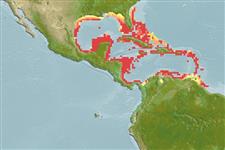Environment: milieu / climate zone / depth range / distribution range
Ecologia
marinhas associadas(os) a recifes; não migratória; intervalo de profundidade 1 - 70 m (Ref. 9710). Subtropical; 33°N - 35°S, 99°W - 28°W (Ref. 55265)
Western Atlantic: Florida, USA and Gulf of Mexico to Brazil. Eastern Central Atlantic: St. Paul's Rocks (Ref. 13121).
Comprimento de primeira maturação / Tamanho / Peso / Idade
Maturity: Lm 22.0 range ? - ? cm
Max length : 45.0 cm TL macho/indeterminado; (Ref. 4858); common length : 30.0 cm TL macho/indeterminado; (Ref. 3797); peso máx. publicado: 1.6 kg (Ref. 26340)
Espinhos dorsais (total) : 14; Raios dorsais (total) : 19 - 21; Espinhos anais: 3; Raios anais : 20 - 21. Tail and pectoral fins entirely yellow. Black spot on forehead has electric blue spots and is surrounded by narrow, electric blue ring. Large blue spot at base of pectoral fin (Ref. 26938). Adults develop short spines on the margin. The color of large adults is purplish blue with yellow-orange rims to the scales; head above eye dark blue, below greenish yellow; mouth, chin, throat, chest and abdomen purplish blue (Ref. 13442)
Found on coral reefs. Generally occurs solitarily or in pairs. Moves gracefully between seafans, seawhips, and corals (Ref. 9710). Stomach contents of 26 specimens indicate that the species feeds almost exclusively on sponges supplemented by small amounts of algae, tunicates, hydroids and bryozoans. Young pick ectoparasites from other fishes (Ref. 9710). Marketed fresh (Ref. 3797).
Ciclo de vida ou comportamento de acasalamento
Maturidade | Reprodução | Desova | Ovos | Fecundidade | Larvas
Allen, G.R., 1985. Butterfly and angelfishes of the world. Vol. 2. 3rd edit. in English. Mergus Publishers, Melle, Germany. (Ref. 4858)
Status na Lista Vermelha da UICN (Ref. 130435: Version 2024-1)
Ameaça para os humanos
Reports of ciguatera poisoning (Ref. 30303)
Uso pelos humanos
Pescarias: pouco comercial; Aquário: Espécies comerciais
Ferramentas
Relatórios especiais
Baixar XML
Fontes da internet
Estimates based on models
Preferred temperature (Ref.
123201): 24.2 - 28, mean 26.7 °C (based on 220 cells).
Índice de diversidade filogenética (Ref.
82804): PD
50 = 0.5078 [Uniqueness, from 0.5 = low to 2.0 = high].
Bayesian length-weight: a=0.03162 (0.01614 - 0.06195), b=2.88 (2.71 - 3.05), in cm total length, based on LWR estimates for this species & (Sub)family-body (Ref.
93245).
Nível Trófico (Ref.
69278): 3.0 ±0.0 se; based on diet studies.
Resiliência (Ref.
120179): Baixo, tempo mínimo de duplicação da população 4,5 - 14 anos (Preliminary K or Fecundity.).
Fishing Vulnerability (Ref.
59153): Low to moderate vulnerability (35 of 100).
Nutrients (Ref.
124155): Calcium = 23.7 [10.8, 43.4] mg/100g; Iron = 0.489 [0.281, 0.849] mg/100g; Protein = 19 [18, 20] %; Omega3 = 0.146 [0.085, 0.251] g/100g; Selenium = 17.6 [8.3, 37.8] μg/100g; VitaminA = 35.8 [8.6, 142.1] μg/100g; Zinc = 0.792 [0.515, 1.183] mg/100g (wet weight);
